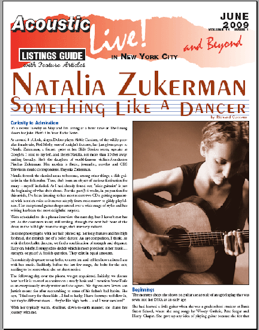Natalia Zukerman
Something Like a Dancer
by Richard Cuccaro
From Curiosity to Admiration
It's a recent Tuesday in May and I'm sitting at a front table at The Living Room for John Platt's On Your Radar Series.
At around 8 o'clock, singer/Dobro player Abbie Gardner, of the wildly popular female trio, Red Molly, one of tonight's features, has just given props to Natalia Zukerman, a former guest at her Slide Session series, upstairs at Googie's. I look to my left, and there's Natalia, not more than 10 feet away, smiling broadly. She's the daughter of world-famous violinist/conductor Pinchas Zukerman. Her mother is flutist, journalist, novelist and CBS Television music correspondent, Eugenia Zukerman.
Natalia forsook the classical arena to become, among other things, a slide guitarist in the folk realm. Thus, she's been an object of curious fascination for many -- myself included. As I had already found out, "slide guitarist" is just the beginning of what she's about. For the past 3-4 weeks, in preparation for this article, I've been listening to her most recent two CDs, getting acquainted with her rich voice as it moves adeptly from stoic sorrow to giddy playfulness. Her exceptional guitar chops extend over a wide range of styles and her writing has been the most delightful surprise.
We're scheduled to do a phone interview the next day, but I haven't met her yet. As she continues to sit, still smiling, through the next half hour of the show, in the half-light from the stage, she's intensely radiant.
In some photographs, with her hair pinned up, her long features and her high forehead, she reminds me of a ballet dancer. An apt comparison, I think. As with the best ballet dancers, we find a combination of strength and elegance. Early on, briefly, I struggled to decide which is more prevalent in her music… strength, or grace? A foolish question. They exist in equal amounts.
I'm suddenly desperate to say hello, to meet her and tell her how smitten I am with her music. Suddenly, before the last few songs, she bolts for the exit, needing to be somewhere else on short notice.
The following day, over the phone, we get acquainted. Initially, we discuss how hard it is to excel as a writer on a steady basis and I mention Steve Earle as an exceptionally steady writer and she agrees. We digress over Steve's son Justin's recent rise after succumbing to some of his father's bad habits. She says, "I feel sorry for those kids…I feel so lucky, I have footsteps to follow in, but they're different shoes… they're like high heels …and I wear sneakers!"
With her typically warm, ebullient, down-to-earth manner, she shares her journey with me.
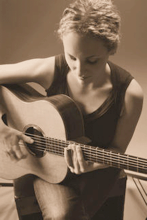
Beginnings
The monster chops she shows on guitar are a result of an upbringing that was sewn into her DNA at an early age.
She had learned a little guitar when she was a grade school student at Bank Street School, where she sang songs by Woody Guthrie, Pete Seeger and Harry Chapin. She gave up any idea of playing guitar because she felt that studying violin was expected of her.
Although forced to study violin from age 5 to 13, she sees it as having been inspirational, rather than burdensome.
"Classical music taught me discipline that I apply to different areas of my life. It's not mindless, but it's not intellectual, It uses all your facilities, physical and mental. What was lacking for me was the spiritual, which I didn't find in that kind of music and still don't. It lulls me into a sense of calm. It doesn't move me emotionally, but feels much more mathematical. Studying that way helped me in my schoolwork. It helped me to cultivate the drive I have today. I set my mind to something and I accomplish it. It's great way to understand everything from geometry to spatial relationships. It's so mathematical and architectural.
She was completely immersed in the life -- "That's what you do -- you wake up in the morning, you have a cup of coffee and you play your instrument. I was just doing what I was used to seeing. The problem was, I wasn't producing the sound I was used to hearing, so it was really frustrating."At around 13 years of age, she decided that she'd had it with the violin, and decided to quit. Before she could quit, her mother told her she had to learn a standard set of music -- which included Mozart, Beethoven and Bach that she hadn't studied yet, before she committed to leaving violin study. The period of
intense practice -- 6 months -- to get through the repertoire gave her a more complete appreciation for the both the genre and the dedication to musicianship.
Then, finally, it was time to move on to guitar.
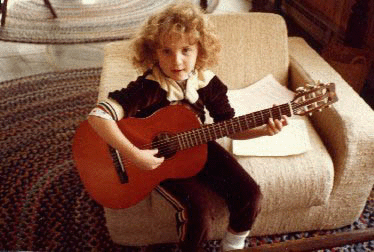
Natalia calls this "playing as a kid with big hair."
We call it "Early Portrait of Future Guitar Hero" (the REAL kind --not the computer game type).
The Guitar
"When I quit violin, I studied classical guitar for two years during high school. To live in my house, you had to study an instrument. My guitar teacher was a total hippie, We'd do a little classical and then he'd help me to learn songs by people like Cat Stevens and Susanne Vega.
After high school, she attended Oberlin College, where she found that the conservatory fostered an atmosphere that was "weirdly competitive." "I'd never felt competitive about music before in my entire life -- it was a difficult thing to study, but never competitive." She hated it and consequently quit studying classical guitar after one semester.
She didn't pick up the guitar again for a couple of years. When she did pick it up again, around 1998, she tuned it to an open tuning -- open D -- for the first time.
She says: "For the first time, I couldn't rely on the knowledge I had -- I had to rely on my ear, my eye and my hand." Ani DiFranco had played at Oberlin and Natalia saw the range of sonic effects-- including percussive--that the guitar would support. "I approached it in a totally new way."
She bought her first good guitar, made by James Goodall in 1998, which she says she felt unworthy of. One anonymous testimonial on the Goodall web site states -- "the feeling I get is like hearing a Steinway compared to a player piano." This made her want to play more, to live up to its excellence as an instrument. "That was it for me," she says. "It pushed me to play it a lot. My style really developed."After graduating from college, Natalia moved to California and set up a mural
painting business, which she still runs, but actively only when touring slows down (visit www.offthewalldesign.com).
The music in her made its presence felt. "I met some folks who were going to open mics and I began going also. I had a handful of my own songs which I mixed in with Grateful Dead covers, and 'whatever.' I kept writing and, at a certain point, in 2001, I had enough to make my first record, Mortal Child, which had 12 originals, some of which I still play today."
Natalia was fortunate to be able to go directly from open mics and playing at friends' gigs, -- no extensive performing experience-- to going into the recording studio. "There were some killer players on that record, people I met around the Bay area. It was my first studio experience, so it was a bit rough, and it was done analog, so it was very time-consuming -- such a learning curve." She did it for the sheer love of it, not feeling as though it was for a career.
When Natalia began to play slide guitar, she attended the Ali Akbar College of Music in Marin, California, founded by Ali Akbar Khan, master Indian sarod player, for one semester. She started listening to slide players from Mississippi Fred McDowell, all the way up to Bonnie Raitt. Natalia found videos unhelpful, and just kept experimenting and figuring out things on her own.
She had the opportunity to open for Kelly Joe Phelps a number of times when he still played slide and learned more.
"I like a cleaner sound, something that imitates the human voice. I don't consider myself a 'slide' player. I use it for some texture here and there."
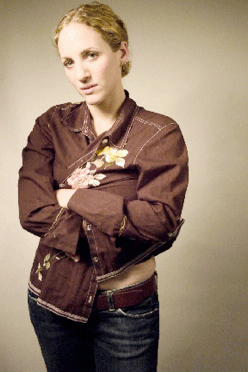
The Career in Earnest
Natalia moved back to New York just before the planes hit the towers. Like others we've talked to, the cataclysmic event of 9/11 caused her to think, "What do you really want to be doing with your life? I really want to give this [music career] a shot." She went to her first folk conference -- Nashville New Music Conference -- and started learning about promotion and other music business practices.
In the summer of 2003, Natalia went on a tour with friends and hasn't looked back since. On a Clear Day, her second CD followed. In 2006, her third CD, Only One was issued. This album, with every track recorded in one take, with no overdubs, shows off Natalia's guitar work in all its nimbleness and raw power.
When we listen to "Winter Coat," a contemporary blues, from Only One, we're encouraged to dispute her assertion that she isn't a slide player. The picking is very clean and the slide work is some of the most satisfying that I've ever heard. We might be hearing some of Kelly Joe's influence on this one.
Jazz is part of her range of stylistic expression. In "Bones," from the same CD, we hear some of Ani DiFranco's influence in the rapid-fire singing of the lines:
If ever there was a time to tell me / If ever there was a time to touch me too long
If ever there was a time to be our time, that time is gone.
However, before I noticed the similarity, what jumped to the fore was the crisp smoothness of the delivery. It's almost scat singing. Any professional jazz singer would be happy with this performance.
I was curious to know where jazz took root with her. She explained that she grew up near Augie's (now Smoke Jazz Club and Lounge) on 105th St. and, while she was still in high school, would go there with her best friend and listen to music on the weekends.

The evolution toward a fuller range of styles went something like this: "The open tunings were starting to drive me crazy," she says, "I couldn't get enough color. So I went back to standard tuning. Then, to learn some jazz chords, I got a fake book and took a few lessons from [jazz guitarist] Mary Halverson. Also when she stated playing out, she played gigs with Nadine Goellner (a favorite of WFUV-FM DJ John Platt), and they learned a lot of jazz standards together so they could get restaurant gigs. From that, Natalia now has about 12 jazz standards she can insert into her repertoire.
Natalia's voice is another source of wonder. It wears the fabric of her emotions like a clingy black cocktail dress. In it's warm edginess, it reminds me of Louise Taylor, contemporary folk's vastly under-appreciated chanteuse. Of great importance is the help her sister Arianna, an opera singer, gave, in showing her the basics of breath support and using her diaphragm.
Had I done a bit more research before listening to her music, I might not have been so surprised at her literacy. The DNA factor could be at work here. Her mother Eugenia, in addition to being "one of the finest flutists of our time (Boston Globe)," has authored two novels as well as non-fiction books.
While the poetry of Natalia's lyrics might be a tad obscure, as good poetry often is, there's no mistaking the weight of their meaning. Her use of metaphor is masterful.
Her latest CD, Brand New Frame, is, for the moment, a pinnacle of her abilities. Produced by Willy Porter, it presents her singing and writing in lush surroundings.
In "The Last Few Miles, we follow the protagonist, approaching her lover's house by car and listen to her tell us about the small minutes that fall into place as we move from moment to moment, on our way to life's next chapter. Life's page is turning and we'll savor the sound of wind in the trees as they sigh outside the car window. It could be just a reverie, but the stately pace of the lyrics and the mourning in the melody tell us a different story:
And I come back to you broken
I come back to you healed
I come back to you cuz I've chosen to you
Until…There is nothing left
There is nothing left…
As she ponders the way family myth and fact live side by side in her perceptions (and ours), we can feel the way she is turning over the unfolding of events and the impending sense of loss.
The soul of my grandfather lives on in a bird
That's what my mother says
Now this from the most practical of women
In the most sensible dress
And there's a part of me that believes her
There's a part of me that can't
It's funny that that's a part of her in me
Counting everything I've spent
Until… There is nothing left
There is nothing left…
Someone or something is on its way out the door.
The jazz underpinnings of "Bill" help to capture memories of a lover like old footage. Using film as a metaphor, she sings:
Remember that old movie we saw
At that great old second run movie theater …
you wore me out like those old velvet chairs
'til we were as slick as that buttered popcorn we shared
You were my candy-coated girl, we were reel-to reel …
Back at those $2 matinees…
Wrapped in her sultry, smoky voice, the song unfolds in gray and sepia
tones, reminding me of Woody Allen's film classic, Manhattan.
There is a brilliance in the sharply chiseled phrases and images in her songs.
They're jewels, radiating out from her core. It's a scary fact that she's still growing, still changing, digging deeper, looking for more ways to express her roiling emotions.There is so much beauty here, it's almost excruciating. Grace and power, side by side.
Something like a dancer.
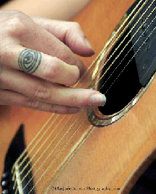
Website: www.nataliazukerman.com
Upcoming Gigs:
June 6 8pm No Place Special House Concert Mashpee MA $15
With Trina Hamlin
Call 508-540-3451 or 508-495-4349 or email
richardfurlani@comcast.net for tickets and info.
11 7pm Musicon4 House Concert
New York NY 212.662.2320 $20
With Trina Hamlin Call or email for reservations and information:
(212)662-2320 or musicon4@earthlink.net. SOLD OUT
call to be put on the waiting list.
12, 13, 14 8pm The Art House 214 Commercial Street Provincetown MA
508-487-9222 $10 With Trina Hamlin
19 8pm Club Passim 47 Palmer Street
Cambridge MA $13/$15
Amy Campbell Opens
July 12 Charlevoix East Park Performance Pavillion
210 State Street, Charlevoix MI
19 Woodstock Folk Festival tba Woodstock IL
$10/$15/$25
25 Falcon Ridge Folk Festival tba
Hillsdale NY playing in Susan Werner's Band
30 S.P.A.C.E 1245 Chicago Avenue Evanston IL
847-492-8860 $12/$15
Adrianne Opens

